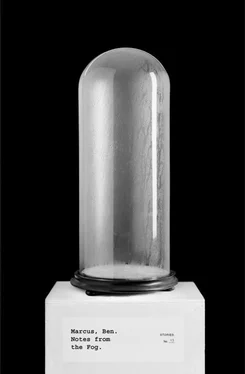The roads might still be packed, he says, and who knows about the weather. Around us there’s a fringe of rain and the sky is black and there’s that sound, a kind of pressurized silence, as if the orchestra is just about to start playing. The conductor will tap his baton and all hell will break loose. We figure we should get out of here, head further inland, and maybe there will be some food and a nice clean bed in a room where we can lock the door. It sounds decadent to me, and delicious, and I sort of cannot wait. We are a team, and it feels like we’ve just broken out of jail together.
We pull onto the highway and I check the news on my phone. “They are calling this storm Boris.”
“Boris,” he says flatly, as if I’ve just told him the name of a distant star.
“What’s the thinking there?” I wonder.
“They needed a B name.”
“Yes, well then, Boris, of course.”
“And they practice a kind of diversity.”
“Yeah?”
“I don’t know. I’m sure they want to be inclusive.”
“Not to trigger anyone by using a regular name?”
“Boris is a regular name,” says James. “In several parts of the world. With massive populations. Possibly more regular than John, worldwide.”
“Then let the storm go bother them.”
“I’m sure there are people named Boris over here.”
“Oh I’m sure. I bet their cocks stink.”
“What is wrong with you?” James is grinning. I don’t think he minds my moods when they’re not directed at him.
“Plenty. I’m hungry and you won’t let me eat. We just have to drive and drive. I’m going to hurl myself from the car.”
James smiles, and he pretends to do math, wetting his finger and tabulating an imaginary problem in the air in front of him. “Fifty,” he says.
“What?”
“I definitely think that’s at least fifty times that you’ve threatened to jump from a moving car. At least since I’ve known you. I can’t be sure about the time before that, but something tells me you had a penchant for it in your early years, too.”
He may be right. I don’t care to reflect too far back, particularly on the threats I may have needed to utter in certain stifling situations as a youth, which, one should not be surprised, very often occurred when I was a passenger in a car. I used to think about it more seriously, imagining myself rolling like a weevil, but finally free of torments. And of course the most delicious part of the fantasy was what would happen in the car after I ejected. The shock, the panic, the deep, abiding respect. Even the jealousy. Someone had finally done what everyone else could only dream of.
“Boo-ya,” I say. “Perhaps a more intuitive name.”
“Beelzebub.”
“Bitch face.”
“Bronwyn.”
“Bald Mountain.”
“Boredom.” And we both laugh.
“Boredom the storm is barreling down the coast. Boredom brings destruction in its wake. Coastal villages still recovering from the deadly effects of Boredom.”
—
The road is kind of gross.There’s a wild, erratic rain, as if some man with a bucket, hiding in a ditch, is occasionally hurling water at us, like from an old film set. We have the news on, and we’ve texted some friends. Everyone is everywhere. A few of them did opt for the cots back at the shelter. What could it hurt, they wrote. And they’ve come around with snacks! Our plan is to push to the next town, but it’s hard to see how that happens in this rain, in this darkness. It’s two hours or so in normal driving conditions, and looking at James, squeezed into an awful, tense ball behind the wheel, gnashing his teeth like a cartoon character, it’s hard to feel that he has two more hours of driving left to give. Poor thing. This is the statistic that is looking to claim our aging, musty bodies: the danger that befalls people in flight from other danger.
“I’m happy to drive,” I say.
“You don’t like how I’m driving?”
Okay, well, see. “I’m offering to help.”
“I’m good. I’m great.”
Sure you are. James is like some harassed sea creature, hiding behind a rock. I rub his neck, smooth down the back of his hair. I need my driver alive. My poor, poor driver. By taking care of him I take care of myself.
“Thanks,” he says. “That feels good. If only I could see. I mean, right? I feel like I’m playing a video game. What you could do is call some hotels or motels up ahead, to see if we can get a room.”
There’s a Holiday Inn and a Motel 6 in the next town. Both lines are busy when I call. I keep trying, and meanwhile I pull up the map on my phone, but my signal is getting spotty, a single bar flickering in and out, and the image of where we are never quite comes through. It’s loading and it’s loading and it’s loading. I see our blue dot, moving slowly over the screen, but there’s no terrain beneath it, just a gray block, as if we’re floating in space over some bottomless void.
James pulls over at a gas station and we get chips. Lots of them, the sort we rarely allow ourselves at home. All bets are off. I would inject drugs into my face right now. I would drink gas from the car with a straw. Inside the store, the single-serving wine bottles look exceptional to me—golden bottles in their own gleaming cooler, a shrine to goodness—but it’s not fair to James, who has to drive. I don’t want him drooling. I don’t want him jealous. I’d prefer to keep his feelings to a minimum.
We can hardly see anything save the lights and the black slashes of rain streaking past, but the same sign keeps appearing on the side of the road, every mile or two: Exit 49 Food. The third time it crawls past, close enough to grab and shake, to possibly dry-hump, I start to salivate. I picture plates of unspecified steaming goodness. Salty, crunchy objects littered over wet mounds of something achingly delicious, with sauce, with sauce, with sauce. Polenta with stinking gorgonzola, maybe, and a fork-tender bone of meat from some brave animal. A shank, a leg, a neck, cooked for four years in a thick mixture of wines. With tall drinks that fizz a little and work directly on quieting down one’s noisy little brain, perhaps even a warm cloudy drink you pour directly into your eyes. James seems to register my reverie and insists again that we keep driving. Have to have to. He slaps the steering wheel. That’s why we bought chips, he cries, trying perhaps to sound like a real human being who feels enthusiasm. It’s sort of awkward. We have chips, he says more quietly. If we stop now we are doomed, goners.
“It’s just that it’s already kind of late, and I’m pretty hungry,” I tell him.
“What are you saying?”
“That it’s late and I’m hungry?”
“If you’re not prepared to offer a solution then maybe you should not speak.”
Well, it’s an interesting rule, and I do enjoy constraints around what can and cannot be said. The deepest kind of etiquette. But if you applied such a standard to everyone, the world over, there’d be very little speech. The world would undergo a near-total vow of silence, with a few exceptions. Perhaps that would be a desired outcome. Perhaps a special island could be set aside for the solution-proffering peoples, who would slowly drive each other to murder.
“Okay, sure, I will restrict myself to a solution-based language. Here’s a solution. Let’s go to a restaurant. That would solve so many problems. The problem of hunger, the problem of exhaustion, the problem of claustrophobia in this goddamn coffin, and the very real threat of escalating discord between two individual passengers.”
“Go to a restaurant and then what? Eating will make us tired. Where will we sleep? I hate being the only one who thinks about these things.”
Читать дальше











